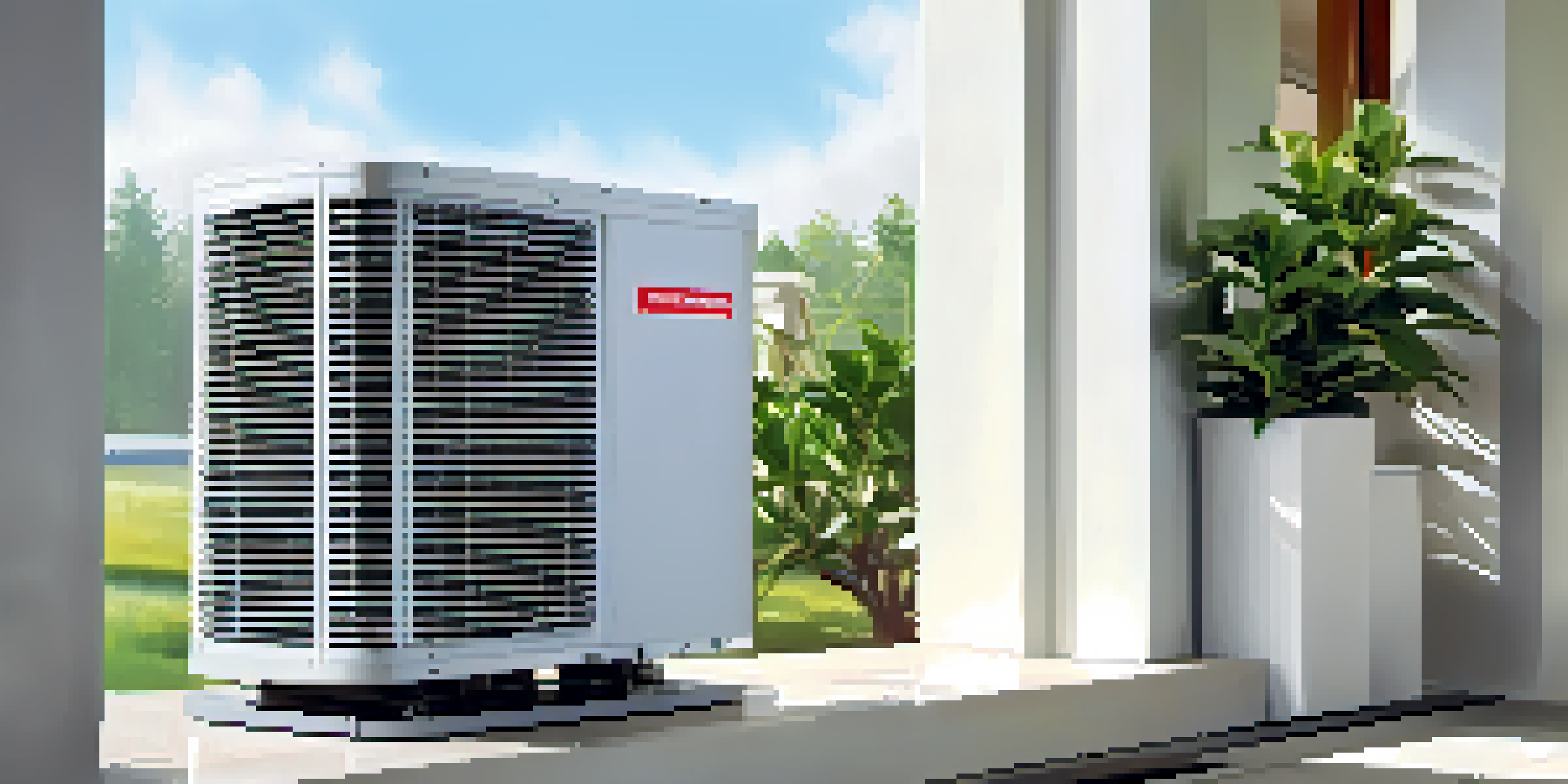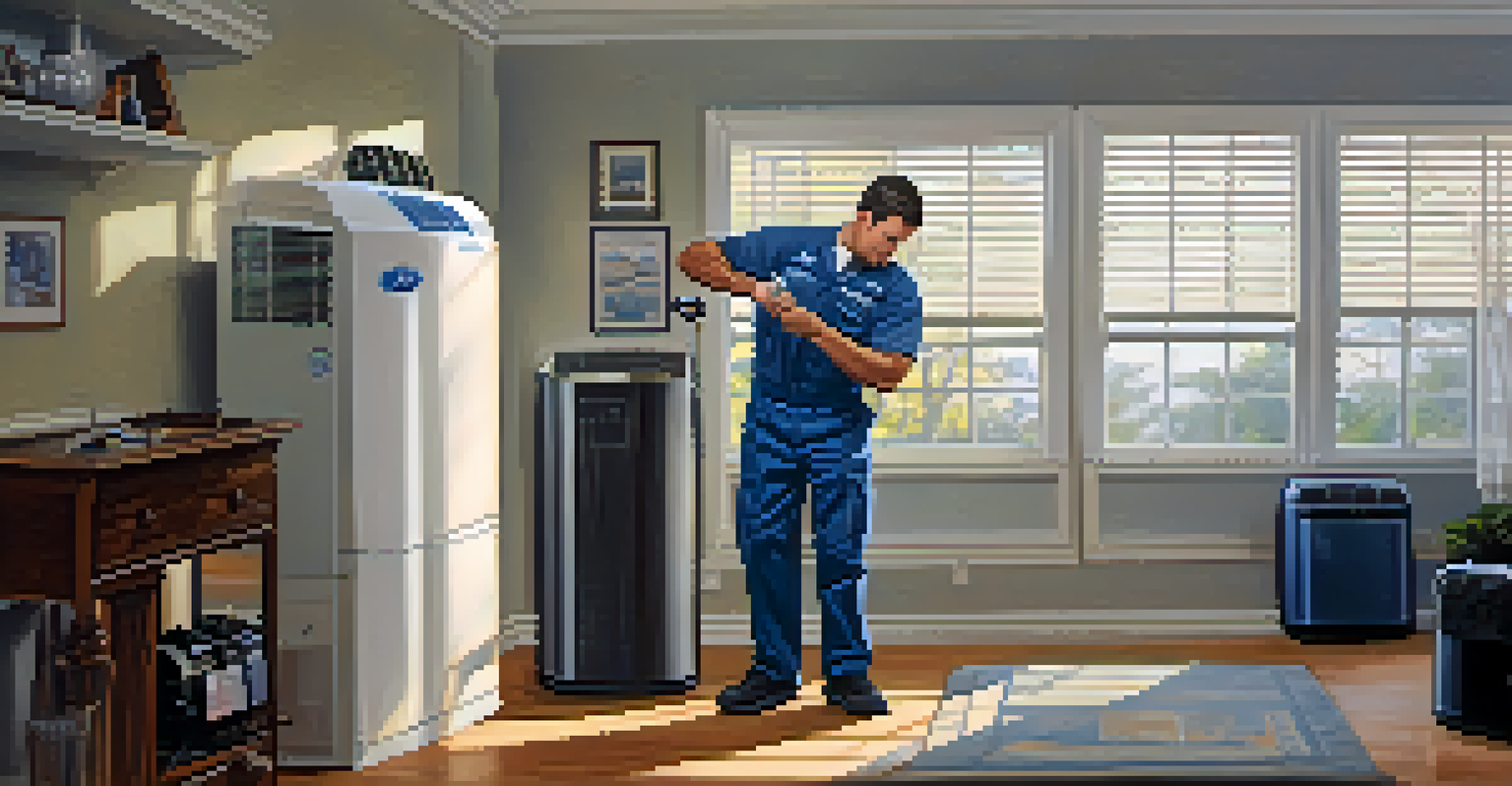How to Fix HVAC Issues Before a Home Inspection

Understanding Common HVAC Issues Home Inspectors Look For
When preparing for a home inspection, it's crucial to understand the common HVAC issues that inspectors typically evaluate. These can range from inadequate airflow to strange noises coming from the system. If your HVAC system isn't functioning properly, it can raise red flags during the inspection process, potentially derailing the sale.
An ounce of prevention is worth a pound of cure.
Inspectors will check for basic operational efficiency, so if your system is making odd sounds or not heating or cooling effectively, it's best to address these concerns beforehand. Moreover, they will look for signs of neglect, such as dirty filters or rusted components, which can indicate poor maintenance over the years. Addressing these issues now can save you from costly repairs later.
In essence, knowing what inspectors are looking for can help you take proactive steps to ensure a smooth inspection process. After all, a well-maintained HVAC system not only boosts your home's value but also creates a comfortable living environment.
Performing a Thorough HVAC System Inspection
Before the home inspection, take the time to conduct a thorough inspection of your HVAC system. Start by checking the thermostat to ensure it's functioning correctly. If it’s not responding or is erratic, this could indicate a bigger issue that needs addressing.

Next, inspect the air filters. Dirty filters can restrict airflow, making your system work harder and less efficiently. Replacing them regularly not only improves performance but also extends the lifespan of your unit. A clean filter is a simple fix that can significantly impact the overall efficiency of your HVAC system.
Identify Common HVAC Issues
Knowing what inspectors look for, such as airflow problems and maintenance neglect, can help you address issues before a home inspection.
Finally, look for any visible signs of wear and tear, such as leaks or corrosion in the ductwork and around the unit itself. By taking a proactive approach and addressing these issues now, you can avoid potential headaches during the inspection.
Ensuring Proper Airflow and Temperature Regulation
Proper airflow is essential for your HVAC system to function efficiently. Check all vents and registers to ensure they are open and unobstructed by furniture or other items. Good airflow not only enhances comfort but also contributes to a more efficient energy usage.
The best way to predict the future is to create it.
Additionally, you should assess the temperature regulation throughout your home. If certain rooms are consistently hotter or colder than others, it might indicate an underlying issue with your HVAC system. Consider balancing your system by adjusting dampers or consulting a professional to improve overall temperature distribution.
By taking the time to optimize airflow and temperature regulation, you're not only improving comfort but also demonstrating to potential buyers that your home is well-maintained and energy-efficient.
Cleaning and Maintaining Your HVAC System
Regular cleaning and maintenance of your HVAC system can significantly enhance its performance. Start with cleaning the outdoor unit by removing debris, leaves, and dirt that can obstruct airflow. A clean unit will operate more efficiently and can prolong its lifespan.
Inside, make sure that the evaporator and condenser coils are clean. Dirty coils can lead to poor heat absorption and increased energy consumption. A simple coil cleaning can improve your system’s efficiency and lower your utility bills.
Regular HVAC Maintenance Matters
Cleaning and maintaining your HVAC system not only enhances performance but also extends its lifespan and saves on energy costs.
Furthermore, don't overlook the importance of regular professional maintenance. Scheduling an annual check-up with a certified HVAC technician can help identify and resolve potential issues before they become major problems, ensuring your system is in top shape for the inspection.
Checking Ductwork for Leaks and Insulation
Ductwork plays a crucial role in the efficiency of your HVAC system. Check for any visible signs of leaks, such as disconnected ducts or gaps at the seams. Even small leaks can lead to significant energy loss, making your system work harder and raising your utility bills.
Additionally, ensure that your ductwork is properly insulated, especially in areas like attics or crawl spaces. Insulation helps maintain the temperature of the air traveling through the ducts, improving overall efficiency. Proper insulation is a simple yet effective way to enhance your HVAC system's performance.
Addressing ductwork issues not only improves comfort but also demonstrates to potential buyers that your home is energy-efficient and well taken care of.
Testing Your HVAC System's Performance
After addressing any issues, it's time to test your HVAC system's performance. Turn on the system and monitor its operation over a few days. Pay attention to the temperature consistency and any unusual noises that could indicate underlying problems.
You should also check the system's responsiveness to the thermostat. If it takes too long to reach the desired temperature or fails to maintain it, this could be a sign of an issue that needs professional attention. A well-functioning system should provide consistent and reliable climate control.
Professional Help Ensures Efficiency
Consulting a professional HVAC technician can uncover hidden problems and provide tailored solutions, ensuring your system is ready for inspection.
By performing this test prior to the home inspection, you can catch any remaining issues early on, making sure your HVAC system is in peak condition for prospective buyers.
Preparing Documentation for Your HVAC System
Having proper documentation for your HVAC system can make a positive impression during a home inspection. Gather all relevant records, including maintenance logs, service history, and warranties. This information can demonstrate that you’ve taken good care of the system over the years.
Additionally, if you've made recent upgrades or repairs, include those details as well. Buyers appreciate knowing that the system is in good condition and that any improvements have been documented. This transparency can ease potential concerns and boost buyer confidence.

In essence, being organized and prepared with your HVAC documentation can contribute to a smoother inspection process and potentially a quicker sale.
Consulting with a Professional HVAC Technician
If you've addressed the common issues but still have concerns, consulting with a professional HVAC technician can offer peace of mind. They have the expertise to identify problems that you might overlook and can provide tailored solutions to ensure your system is functioning optimally.
A technician can perform a thorough inspection, recommend necessary repairs, and even suggest upgrades that can make your system more efficient. This proactive approach can save you time and money, ensuring that your HVAC system is in top shape before the inspection.
Ultimately, enlisting the help of a professional demonstrates your commitment to maintaining your home and can give potential buyers confidence in their investment.